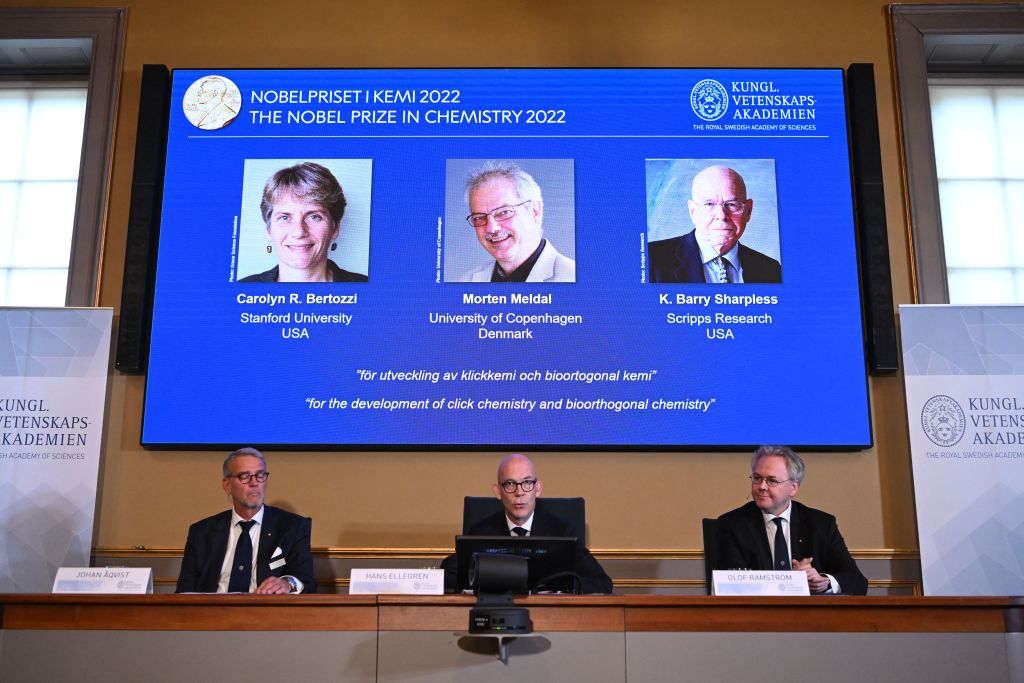Nobel Prize in Chemistry goes to 3 scientists for work on building molecules


A free daily email with the biggest news stories of the day – and the best features from TheWeek.com
You are now subscribed
Your newsletter sign-up was successful
The Nobel Prize in Chemistry was awarded to Carolyn R. Bertozzi, Morten Meldal, and K. Barry Sharpless for their work developing click chemistry and bio-orthogonal chemistry. Click chemistry creates fast and straightforward reactions where molecules snap together quickly, CNN reports. This method of building molecules can have a number of real-world applications, especially in the development of pharmaceuticals.
Sharpless, a chemistry professor at Scripps Research in La Jolla, California, originally coined the concept of click chemistry. Shortly after, both he and Meldal, based at the University of Copenhagen, discovered the key reaction of click chemistry independently, The New York Times reports. Bertozzi, a professor at Stanford University, was then able to apply the concept to biomolecules on cells' surfaces without disrupting their chemistry. Her work later allowed for click reactions to take place within cells, leading to the creation of bio-orthogonal reactions.
The three winners' work is being studied further for its potential to treat cancer. Bertozzi remarked that bio-orthogonal reactions allow scientists to "[do] chemistry inside human patients to make the drugs go to the right place." This system could be used to send toxic compounds to cancer cells, an area of research that is currently in development.
The Week
Escape your echo chamber. Get the facts behind the news, plus analysis from multiple perspectives.

Sign up for The Week's Free Newsletters
From our morning news briefing to a weekly Good News Newsletter, get the best of The Week delivered directly to your inbox.
From our morning news briefing to a weekly Good News Newsletter, get the best of The Week delivered directly to your inbox.
Sharpless became the fifth person ever to win two Nobels, the first of which he won in 2001, CNN continues. Bertozzi also became the eighth woman to win the award.
"[C]lick chemistry and bio-orthogonal reactions have taken chemistry into the era of functionalism," the Nobel Committee said, "this is bringing the greatest benefit to humankind."
A free daily email with the biggest news stories of the day – and the best features from TheWeek.com
Devika Rao has worked as a staff writer at The Week since 2022, covering science, the environment, climate and business. She previously worked as a policy associate for a nonprofit organization advocating for environmental action from a business perspective.
-
 Palantir's growing influence in the British state
Palantir's growing influence in the British stateThe Explainer Despite winning a £240m MoD contract, the tech company’s links to Peter Mandelson and the UK’s over-reliance on US tech have caused widespread concern
-
 Quiz of The Week: 7 – 13 February
Quiz of The Week: 7 – 13 FebruaryQuiz Have you been paying attention to The Week’s news?
-
 Nordic combined: the Winter Olympics sport that bars women
Nordic combined: the Winter Olympics sport that bars womenIn The Spotlight Female athletes excluded from participation in demanding double-discipline events at Milano-Cortina
-
 5 recent breakthroughs in biology
5 recent breakthroughs in biologyIn depth From ancient bacteria, to modern cures, to future research
-
 Blue Origin launches Mars probes in NASA debut
Blue Origin launches Mars probes in NASA debutSpeed Read The New Glenn rocket is carrying small twin spacecraft toward Mars as part of NASA’s Escapade mission
-
 Dinosaurs were thriving before asteroid, study finds
Dinosaurs were thriving before asteroid, study findsSpeed Read The dinosaurs would not have gone extinct if not for the asteroid
-
 SpaceX breaks Starship losing streak in 10th test
SpaceX breaks Starship losing streak in 10th testspeed read The Starship rocket's test flight was largely successful, deploying eight dummy satellites during its hour in space
-
 Rabbits with 'horns' sighted across Colorado
Rabbits with 'horns' sighted across Coloradospeed read These creatures are infected with the 'mostly harmless' Shope papilloma virus
-
 Lithium shows promise in Alzheimer's study
Lithium shows promise in Alzheimer's studySpeed Read Potential new treatments could use small amounts of the common metal
-
 Scientists discover cause of massive sea star die-off
Scientists discover cause of massive sea star die-offSpeed Read A bacteria related to cholera has been found responsible for the deaths of more than 5 billion sea stars
-
 'Thriving' ecosystem found 30,000 feet undersea
'Thriving' ecosystem found 30,000 feet underseaSpeed Read Researchers discovered communities of creatures living in frigid, pitch-black waters under high pressure
